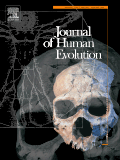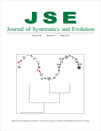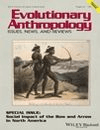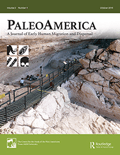
JOURNAL OF HUMAN EVOLUTION
metrics 2024
Unraveling the Mysteries of Human Evolution
Introduction
The JOURNAL OF HUMAN EVOLUTION, published by ACADEMIC PRESS LTD - ELSEVIER SCIENCE LTD, is a premier academic journal focusing on the evolutionary biology of humans and their ancestors. With an esteemed Q1 ranking in the fields of Anthropology and Ecology, Evolution, Behavior and Systematics, this journal is a vital resource for researchers, professionals, and students dedicated to understanding human origins and evolutionary processes. The journal has been steadfastly contributing to the field since 1972, converging knowledge and insights through meticulously peer-reviewed articles. Additionally, it holds an impressive Scopus rank of #12/502 in Anthropology and #105/721 in Ecology, underlining its significant impact and prestige within the academic community. While the journal is not open access, its content remains accessible to those within institutional affiliations, fostering an environment rich in scholarly exchange and innovation. By disseminating cutting-edge research and comprehensive reviews, the JOURNAL OF HUMAN EVOLUTION continues to illuminate the complex narrative of human evolution and is essential reading for anyone engaged in this dynamic field.
Metrics 2024
 1.37
1.37 3.10
3.10 3.20
3.20 139
139Metrics History
Rank 2024
Scopus
IF (Web Of Science)
JCI (Web Of Science)
Quartile History
Similar Journals

Journal of Systematics and Evolution
Unveiling Insights in Systematics and Plant ScienceThe Journal of Systematics and Evolution, published by WILEY, is a premier academic journal dedicated to advancing the fields of Ecology, Evolution, Behavior, and Systematics and Plant Science. With a distinguished Q1 ranking in both of these critical categories in 2023, it stands at the forefront of scientific research, placing it in the top quartile among its peers. Featuring both an ISSN of 1674-4918 and an E-ISSN of 1759-6831, the journal has been converging innovative research since its inception in 2008. The journal caters to a global audience of researchers, professionals, and students, providing a platform for disseminating significant findings and fostering academic dialogue. Its impressive Scopus rankings further affirm its impact, coming in at Rank #62/721 in Ecology and Rank #48/516 in Plant Science, highlighting its relevance and influence in these vibrant fields. As an open-access journal, it ensures that groundbreaking research is accessible to all, thus enhancing collaborative opportunities within the scientific community.

American Journal of Biological Anthropology
Fostering Global Dialogue in Biological AnthropologyThe American Journal of Biological Anthropology, published by WILEY, is a premier journal in the field of biological anthropology, boasting critical insights into human biological diversity, evolution, and adaptation. With its ISSN 2692-7691, this journal has established itself firmly within the research community, achieving a Q1 ranking in key disciplines such as Anatomy, Anthropology, Archeology, and Paleontology as of 2023. This indicates its significant impact, with Scopus rankings placing it in the top tiers across diverse fields, including a stellar rank of 13th out of 113 in Paleontology. Offering open access possibilities, the journal facilitates wider dissemination of groundbreaking research and is committed to advancing knowledge that intersects genetics, epidemiology, and anthropology. Based in the United States, the journal continually fosters an international dialogue among researchers, professionals, and students eager to explore the complexities of human biology through a robust and interdisciplinary lens.

AMERICAN JOURNAL OF PHYSICAL ANTHROPOLOGY
Pioneering Research on Human VariationAMERICAN JOURNAL OF PHYSICAL ANTHROPOLOGY, published by Wiley, has established itself as a leading platform in the field of physical anthropology since its inception in 1918. This esteemed journal, identifiable by its ISSN 0002-9483 and E-ISSN 1096-8644, has been instrumental in disseminating groundbreaking research, achieving impressive rankings in both Social Sciences (Rank #18/443, 96th percentile) and Medicine (Rank #9/44, 80th percentile) categories within Scopus. Although its coverage in Scopus has concluded as of 2021, the journal continues to be a vital resource for academics and professionals seeking to explore the biological aspects of human evolution and variation. With a commitment to high-quality, peer-reviewed publications, the journal supports open access to enhance the visibility and accessibility of anthropological research globally. Researchers, students, and professionals are encouraged to engage with the innovative findings published in this journal, contributing to the ongoing dialogue in physical anthropology.

Journal of Language Evolution
Innovating the Dialogue Between Linguistics and NeuroscienceThe Journal of Language Evolution, published by Oxford University Press, serves as a vital resource in the intersection of linguistics, psychology, and neuroscience. With an ISSN of 2058-4571, this prestigious journal has established itself as a prominent platform for innovative research since its inception in 2016, converging valuable insights up to 2023. It boasts notable rankings, including Q1 in Linguistics and Language and Q2 in both Developmental and Educational Psychology and Developmental Neuroscience, reflecting its high impact and relevance in the academic community. The journal is indexed in Scopus, where it ranks in the 93rd percentile for Linguistics and Language, showcasing its influence among leading scholars. Researchers, professionals, and students will find the journal’s rigorous analysis and interdisciplinary approach essential for advancing their understanding of language evolution and its broader implications. Although access is limited, the journal’s commitment to excellence positions it as a must-read for those engaged in these dynamic fields.

Evolutionary Biology
Unraveling the Mysteries of Life's EvolutionEvolutionary Biology is a distinguished academic journal published by Springer, focusing on the intricate fields of ecology, evolution, behavior, and systematics. This journal, with the ISSN 0071-3260 and E-ISSN 1934-2845, has established itself as a critical platform for cutting-edge research and innovative ideas that shape our understanding of biological evolution and its implications. Operating from Germany, it ranks in the Q2 quartile in its category for 2023, placing it in the top tier of journals recognized for quality and impact, with a Scopus rank in the 66th percentile among its peers. Despite not being Open Access, this journal ensures comprehensive dissemination of knowledge essential for researchers, professionals, and students passionate about evolutionary studies. With a publication history tracing back to 1993 and converging years up to 2024, Evolutionary Biology continues to significantly impact the academic landscape, fostering dialogue and collaboration across various disciplines within the biological sciences.

Relaciones
Advancing Knowledge, Enriching Perspectives.Relaciones is a prestigious open-access journal published by the SOC ARGENTINA ANTROPOLOGIA, dedicated to the field of anthropology. Since its inception in 1937, this journal has served as a vital platform for disseminating innovative research and insights within the social sciences community. With both its print (ISSN: 0325-2221) and online (E-ISSN: 1852-1479) formats, Relaciones ensures widespread accessibility, empowering researchers, professionals, and students to engage with contemporary anthropological discourse. The journal aims to foster critical discussions that not only reflect on cultural and societal issues but also contribute to theoretical advancements in anthropological methodologies. By maintaining a commitment to quality and open access, Relaciones plays a crucial role in shaping the future of anthropology in Argentina and beyond, encouraging scholarly collaboration and enriching the academic landscape.

Anthropologie-International Journal of Human Diversity and Evolution
Unraveling the Threads of Human EvolutionAnthropologie-International Journal of Human Diversity and Evolution is a prominent peer-reviewed journal published by the esteemed MORAVIAN MUSEUM in the heart of the Czech Republic. With a focus on anthropology, this journal serves as a vital platform for the dissemination of innovative research that explores human diversity and evolutionary studies. The journal operates under a rigorous academic framework and is categorized in the Q3 quartile for anthropology in 2023, reflecting its significance in the field. Although it does not currently offer open access options, Anthropologie facilitates the exchange of knowledge through its carefully curated articles spanning diverse topics within human evolution. Its Scopus ranking (320 out of 502 in social sciences) underscores its role as a relevant source for scholars and professionals alike, fostering dialogue and advancements in understanding human diversity. Researchers, students, and practitioners can look forward to engaging content that not only enlightens but also inspires further inquiry into anthropological studies.

Archaeological and Anthropological Sciences
Bridging Disciplines, Uncovering InsightsArchaeological and Anthropological Sciences is an esteemed peer-reviewed journal published by Springer Heidelberg, specializing in the interdisciplinary fields of archaeology and anthropology. Since its inception in 2009, this journal has established itself as a pivotal resource for researchers and professionals, featuring cutting-edge studies that bridge the gap between the sciences and humanities. With its impressive 2023 Q1 rankings in Anthropology and Archaeology categories, the journal stands out in the Scopus landscape, ranking within the top 5% of its field—Rank #18/413 in Archaeology (Arts and Humanities) and Rank #28/502 in Anthropology. This is complemented by its commitment to disseminating high-quality research to a global audience, despite being a non-Open Access publication. The journal's scope encompasses innovative methodologies, archaeological findings, and anthropological insights that are vital for advancing knowledge and fostering academic discourse. As it moves toward its upcoming converged years, Archaeological and Anthropological Sciences continues to solidify its reputation as a key forum for scholarly exchange in these fields.

EVOLUTIONARY ANTHROPOLOGY
Transforming Perspectives on Evolutionary StudiesEVOLUTIONARY ANTHROPOLOGY is a premier journal published by WILEY, dedicated to advancing the field of anthropology through innovative and rigorous research. With an ISSN of 1060-1538 and an E-ISSN of 1520-6505, this journal boasts a remarkable Q1 ranking in both the Anthropology and Medicine (miscellaneous) categories, reflecting its significant impact within the academic community. Since its inception in 1992, it has continuously evolved, now encompassing a wide array of subjects pertinent to evolutionary studies and human health. Residing in the highly competitive Scopus rankings, it stands at an impressive rank of 10 out of 502 in the field, placing it within the top 2% of journals in Social Sciences - Anthropology. Researchers, professionals, and students alike will find this journal an invaluable resource for the latest findings, theoretical advancements, and discussions that shape our understanding of human evolution and its biological implications. While not categorized as an Open Access journal, EVOLUTIONARY ANTHROPOLOGY remains a vital outlet for high-quality scholarship, fostering dialogue and enriching knowledge across diverse audiences.

PaleoAmerica
Revealing the Rich Tapestry of Prehistoric AmericaPaleoAmerica, published by Routledge Journals, Taylor & Francis Ltd, is a leading academic journal dedicated to advancing the study of ancient peoples of the Americas. With a strong presence in the fields of archaeology, ecology, and paleontology, this journal holds Q1 rankings in its respective categories for 2023, reflecting its exceptional impact and relevance in academia. Covering a broad spectrum of topics related to human and ecological evolution from 2015 to 2024, PaleoAmerica serves as a vital resource for researchers, professionals, and students eager to explore pivotal findings and theories related to the prehistoric populations of North and South America. While the journal operates under a subscription model, its comprehensive scope and high-quality peer-reviewed articles make it indispensable for those engaging with the complex narratives of ancient American life.